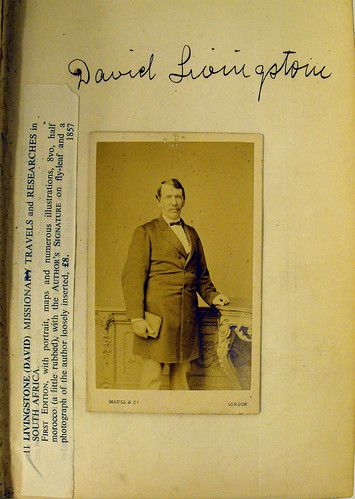David Livingstone
David Livingstone: Missionary Travels and Researches in South Africa
London: John Murray, 1857
Sp Coll Hepburn 241On the front flyleaf of this volume is the autograph of David Livingstone (1813-1873). Livingstone was born in Blantyre in Lanarkshire, the son of a cotton spinner. From childhood onwards he was very studious, and had ambitions to become a medical missionary for China. By working as a spinner he earned enough to pay his way as a medical student at Anderson's College in Glasgow and attend Greek classes at the University of Glasgow, as well as divinity classes given by the Glasgow Congregationalist minister, Ralph Wardlaw.
In 1841, Livingstone was appointed to a missionary post on the edge of the Kalahari desert in southern Africa. He believed he had a mission to introduce Christianity to the peoples of Africa; he aslo believed he must free them from slavery. In 1855, Livingstone was the first non-African to discover the magnificent waterfall which he called the "Victoria Falls", and in May 1856 he became the first European to cross the width of southern Africa.
Livingstone returned to Britain a great hero and his best-selling book Missionary Travels and Researches in South Africa was written during a relatively brief stay in London. Although it builds on earlier accounts of southern Africa, it stands out because of its intellectual breadth, benefiting from his wide study, correspondence and journal entries.
Now a national hero, Livingstone resigned from the London Missionary Society to plan an expedition to assess the prospects for British trade up the Zambezi river. Sadly, several lives were lost during this epic journey, including that of Livingstone's wife, Mary, and attempts to end the slave-trade failed. Now Livingstone resolved to look for the source of the river Nile. Another expedition was launched and in 1869 Livingstone had reached Ujiji, where his historic meeting with the journalist Henry Morton Stanley took place, the latter greeting him with the now famous words, "Dr. Livingstone, I presume?".
By now Livingstone's health was failing and when he died on 30 April, 1873, his heart and viscera were buried on the spot, but his body was returned to be buried at Westminster Abbey: once again he was hailed as a national hero.
Livingstone became the symbol of British idealism about the motives for taking over tropical Africa in the nineteenth century; according to the Oxford Dictionary of National Biography, "In effect, he redeemed the colonial project." To Livingstone, the industrial revolution appeared to be part of a divine plan. Modern re-appraisal of the man and his achievements has revealed a complex individual, whose writings have acquired new value as a rich source for the history of Africa.

Image: Front flyleaf of David Livingstone's Missionary Travels and Researches in South Africa showing autograph and pasted in photograph of the author.
Go to the next book in the exhibition, previously owned by: Oscar Wilde.


